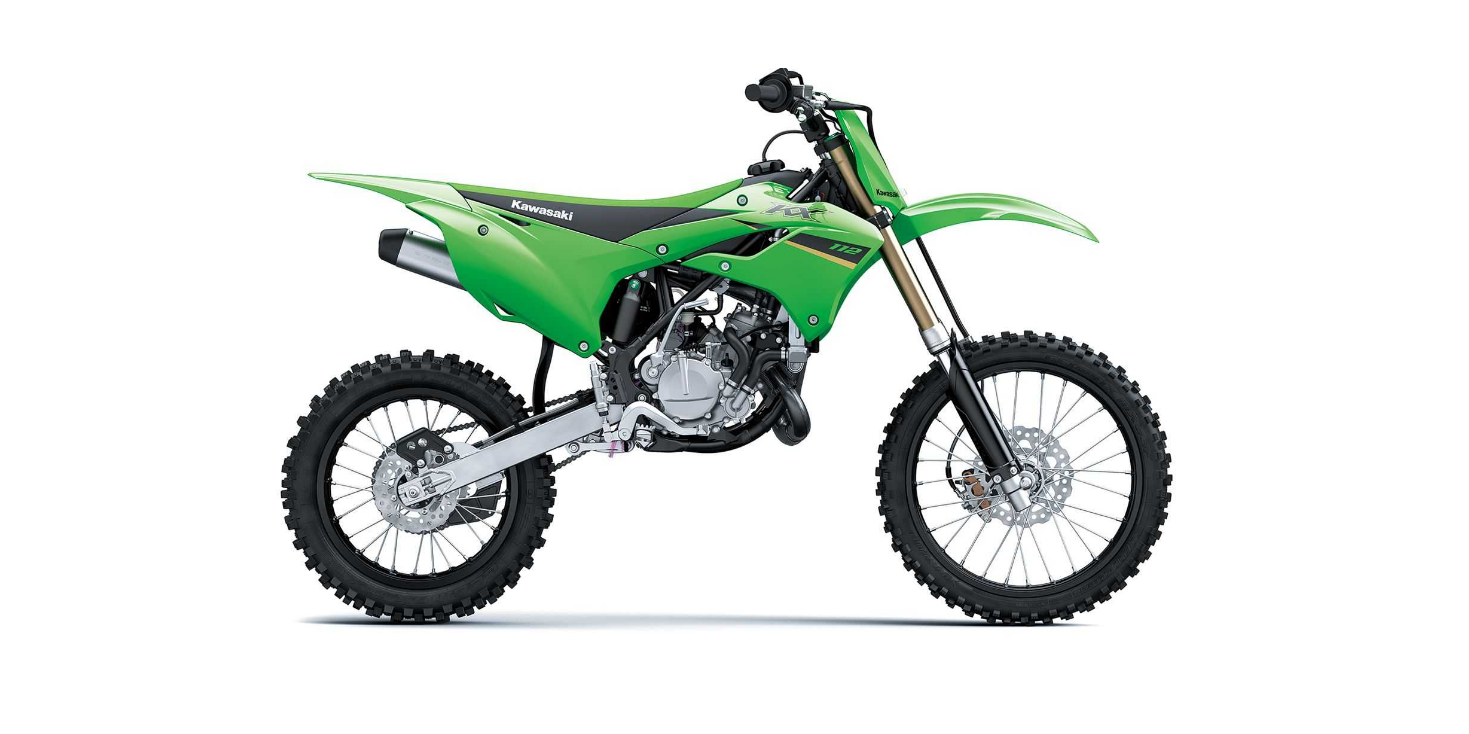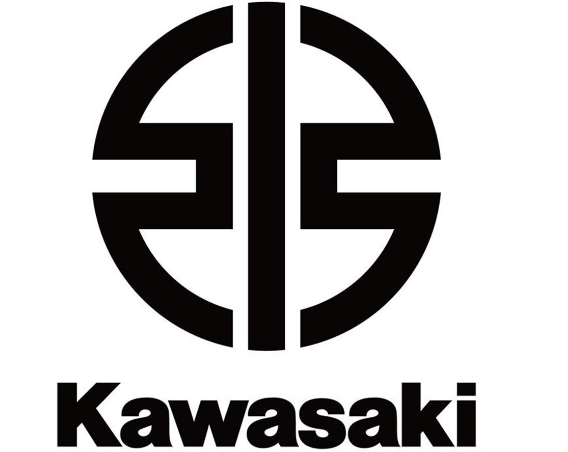2022 Kawasaki KX112 Fuel
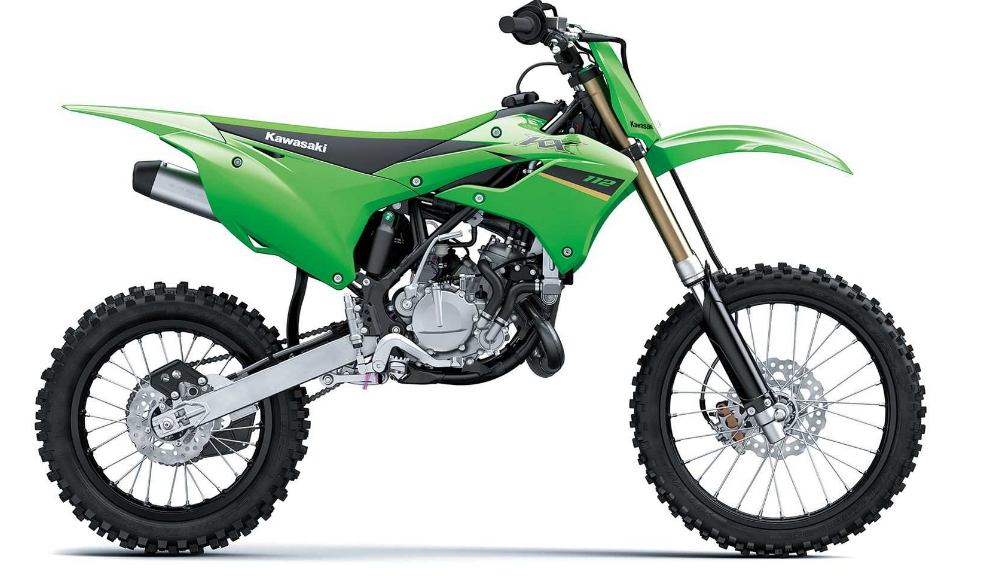
Fuel
The Kawasaki KX is equipped with a 2-stroke engine that requires a gasoline-oil mixture.
Fuel Tank Capacity
- 5.0L (1.3 US gal)
To open the fuel tank cap, pull out the breather hose from the hole in the steering shaft, and turn the tank cap counterclockwise.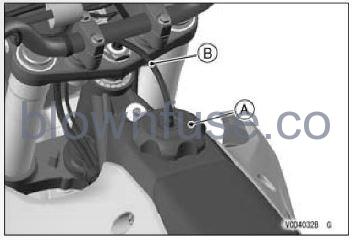
- A. Fuel Tank Cap
- B. Breather Hose
Avoid filling the tank in the rain or where heavy dust is blowing so that the fuel does not get contaminated.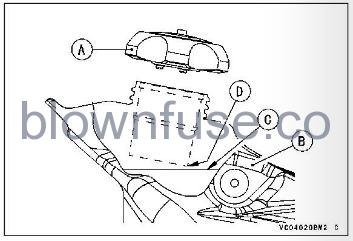
- A. Fuel Tank Cap
- B. Fuel Tank
- C. Top Level
- D. Filler Neck
WARNING
Gasoline is extremely flammable and can be explosive under certain conditions, creating the potential for serious burns. Always stop the engine and do not smoke. the area is well ventilated and free from any source of flame or sparks; this includes any appliance with a pilot light. Never fill the tank completely to the top. As the fuel expands in a warm tank, it may overflow through the vents in the tank cap. After refueling, make sure the fuel tank cap is closed securely. If gasoline is spilled on the fuel tank, wipe it off immediately.
Fuel Requirement
Fuel Type
Use clean, fresh unleaded gasoline with a minimum Antiknock Index of 90. The Antiknock Index is posted on service station pumps in the U.S.A. The octane rating of a gasoline is a measure of its resistance to detonation or “knocking”. The Antiknock Index is an average of the Research Octane Number (RON) and the Motor Octane Number (MON) as shown in the table below.

NOTICE
- If engine “knocking” or “pinging” occurs, use a different brand of gasoline of a higher octane rating.
- If this condition is allowed to continue it can lead to severe engine damage.
- Gasoline quality is important. Fuels of low quality or not meeting standard industry specifications may result in unsatisfactory performance. Operating problems that result from the use of poor quality or non-recommended fuel may not be covered under your warranty.
Fuels Containing Oxygenates
- Gasoline frequently contains oxygenates (alcohols and others), especially in areas of the U.S. and Canada that are required to sell such reformulated fuels as part of a strategy to reduce exhaust emissions.
- The types and volume of fuel oxygenates approved for use in unleaded gasoline by the U.S. Environmental Protection Agency include a broad range of alcohols and ethers, but only two components have seen any significant level of commercial use
- Gasoline/Alcohol Blends – Gasoline containing up to 10% ethanol (alcohol produced from agricultural products such as corn), also known as “gasohol” is approved for use.
NOTICE
- Avoid using blends of unleaded gasoline and methanol (wood alcohol) whenever possible, and never use “gasohol” containing more than 5% methanol. Fuel system damage and performance problems may result.
- Gasoline/Ether Blends The most common ether is methyl tertiary butyl ether (MTBE). You may use gasoline containing up to 15% MTBE.
NOTE
Other oxygenates approved for use in unleaded gasoline include TAME (up to 16.7%) and ETBE (up to 17.2%). Fuel containing these oxygenates can also be used in your Kawasaki.
NOTICE
- Never use gasoline with an octane rating lower than the minimum specified by Kawasaki.
- Never use “gasohol” with more than 10% ethanol, or more than 5% methanol. Gaso line containing methanol must also be blended with cosolvents and corrosion inhibitors.
- Certain ingredients of gasoline may cause paint fading or damage. not to spill gasoline or gasoline oxygenate blends during refueling.
- When not operating your Kawasaki for 30 to 60 days, mix a fuel stabilizer (such as STA-BIL) with the gasoline in the fuel tank. Fuel stabilizer additives inhibit oxidation of the fuel which minimizes gummy deposits. Never store this product with “gasohol” in the fuel system. Before storage, it is recommended that you drain all fuel from the fuel system. See the Storage section in this manual.
2-Stroke Oil
Oil must be mixed with the gasoline to lubricate the piston, cylinder, crankshaft bearings, and connecting rod bearings.
Recommended Oil
Kawasaki Performance 2-Stroke Racing Oil or equivalent 2-stroke engine lubricant Kawasaki Performance Oils and Lubricants have been specifically engineered for your vehicle. Consistent use of these products meets or exceeds service requirements and can help to extend the life of your Kawasaki.
Gasoline-Engine Oil Mixing Ratio
- During break-in period 16:1 (Gasoline: Engine Oil)
- After break-in period 32:1 (Gasoline: Engine Oil)
A 32-to-1 mixture is about 31 mL of oil per liter of gasoline or 4 fluid ounces of oil per gallon of gasoline.
NOTICE
- Do not use vegetable and mineral oils. Too much oil will cause excessive smoking and spark plug fouling. Too little oil will cause engine damage or premature wear.
- To prepare the gasoline-oil mixture, pour the oil and half of the gasoline into a container first and stir thoroughly. Then, add the rest of the gasoline and stir the mixture wel.
NOTE
- At low temperatures, the oil will not easily mix with gasoline. mixture. Take time to ensure a well-blended
- The lubricative quality of the gasoline-oil mixture deteriorates rapidly; therefore, prepare a fresh mixture for each day of operation.
